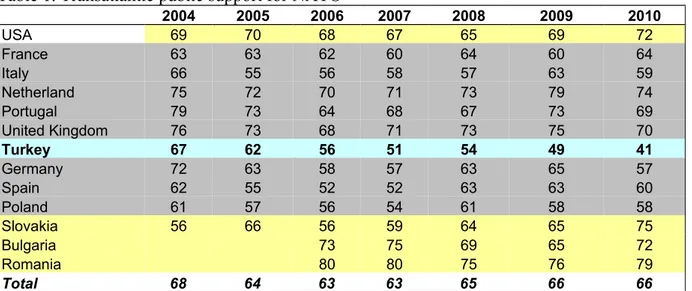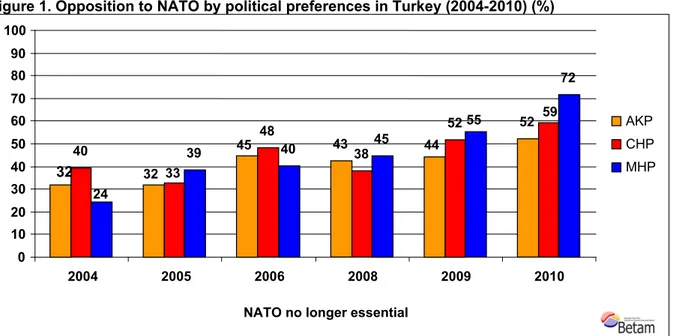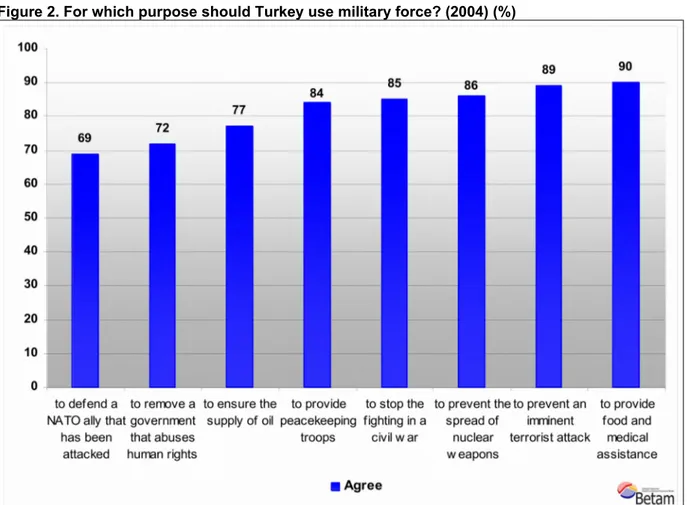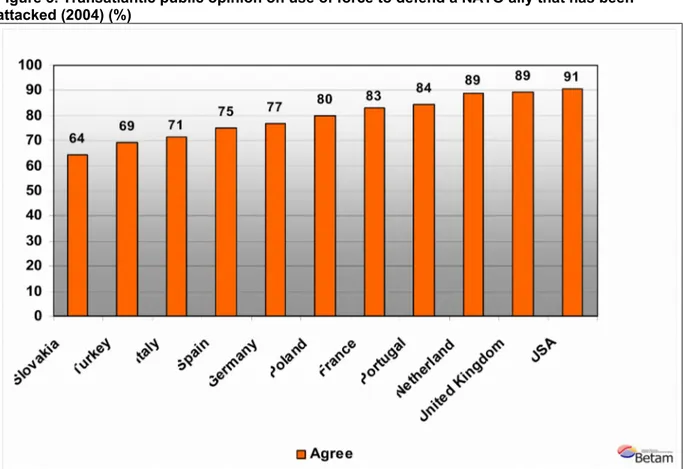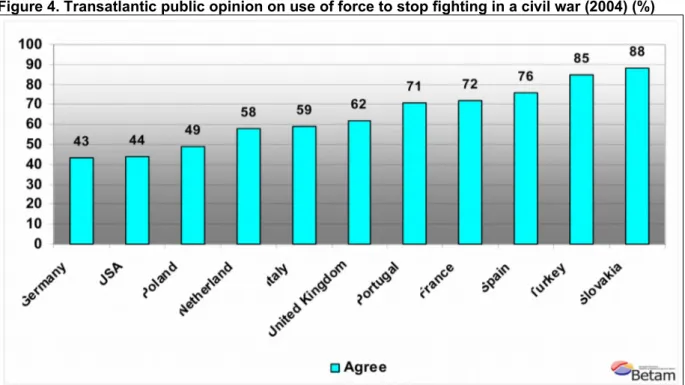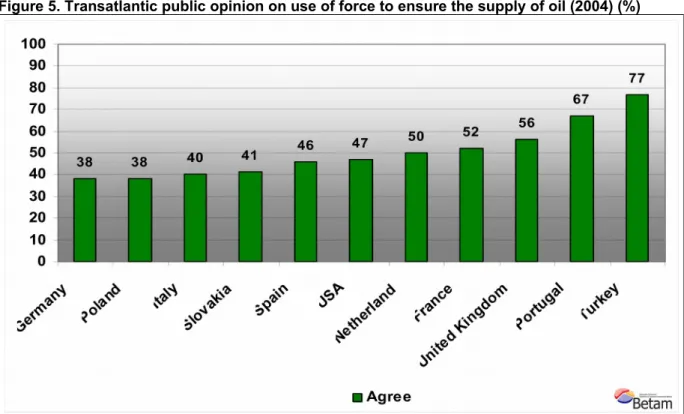TURKS ARE GETTING APART FROM NATO
Ebru Ş. Canan-Sokullu ve Burcu Ertunç Executive Summary
This research note examines Turkish public opinion on NATO, the impact of political party preferences on this opinion, the circumstances under which Turkish public opinion gives support to NATO and issues related to use of force. According to the Transatlantic Trends Surveys (TTS) (2004-2010), public opinion in nine EU countries, in the USA and Turkey on NATO, and on the issue of use of military force to support a NATO ally has been diverse. Cross-country and longitudinal results show that Turks’ support for NATO for national security has gradually decreased since 2004 (in 2004, 67 percent of Turks believed that NATO was essential, whereas in 2010 this opinion shrunk to 41 percent point level). Even more, Turks are the most critical of NATO among other countries in the study.
This study examines public opinion on NATO considering the domestic political party preferences and relates mass public attitudes to political discourse on NATO in Turkey. The results show that MHP supporters are the fiercest anti-NATO group, AKP supporters are rather moderately against NATO. Those who support CHP have adopted consistently negative attitudes to NATO over time.
This study finds out that Turks are the largest supporters of military operations to intervene in an internal conflict in another country (85 %). In comparison with public opinion in other countries, Turks support the use of national armed forces to ensure the supply of oil at the highest level (77 %). Yet, they have the most critical attitudes towards use of Turkish military forces to defend a NATO ally that has been attacked (69 %). These results enable us to comment on the recent NATO operation on Libya, which officially initiated to stop an internal conflict in Libya, yet has called into mind the question whether the real purpose of the operation for Western powers is to get a more secure access to rich energy supplies in the country. Given the purpose of the operation and keeping in mind the findings of this analysis, it would not be wrong to expect that Turks, without even the support of other NATO allies, would support intervention in Libya, presumably due to the energy and oil needs and to the fact of growing internal instability and conflict therein.
Turks do not think that NATO is ‘still essential’
Asst. Prof. Dr. Ebru Ş. Canan-Sokullu, Bahçeşehir University, Faculty of Economics and Administrative Studies, ebru.canan@bahcesehir.edu.tr
Burcu Ertunç, Betam Social Research Unit, Research Assistant, burcu.ertunc@bahcesehir.edu.tr
1.
Research Brief 11/110
a.
i.Transatlantic Trends Surveys (TTS)1 has examined public opinion on NATO and its role in international security with the question that reads “Some people say that NATO is still essential to our country’s security. Others say it is no longer essential. Which of these views is closer to your own?” 2 Based upon this question, Turkish public opinion in comparison with the European and American public opinion on use of military forces for different purposes and circumstances is analyzed with “Now I would like to ask you some questions about when [country] should use its military force. For each of the following reasons, would you approve or disapprove the use of [Turkish] military forces? a) to prevent an imminent terrorist attack b) to provide food and medical assistance to victims of war c) to stop the fighting in a civil war d) to ensure the supply of oil e) to provide peacekeeping troops after a civil war has ended f) to remove a government that abuses human rights g) to prevent the spread of nuclear weapons h) to defend a NATO ally that has been attacked”.
Results show that transatlantic public opinion on NATO across years presents a rather oscilating pattern of support. Yet, in Turkey, a gradual decline in support is observed between 2004 and 2010 (Table 1). While in 2004 and 2005, Turkish public opinion was very close to mean support scores, a deepening gap occurred 2006 onwards, which marked a 25 points distance from the average transatlantic support scores (66 %) in 2010 (Table 1).
Table 1. Transatlantic public support for NATO
2004 2005 2006 2007 2008 2009 2010 USA 69 70 68 67 65 69 72 France 63 63 62 60 64 60 64 Italy 66 55 56 58 57 63 59 Netherland 75 72 70 71 73 79 74 Portugal 79 73 64 68 67 73 69 United Kingdom 76 73 68 71 73 75 70 Turkey 67 62 56 51 54 49 41 Germany 72 63 58 57 63 65 57 Spain 62 55 52 52 63 63 60 Poland 61 57 56 54 61 58 58 Slovakia 56 66 56 59 64 65 75 Bulgaria 73 75 69 65 72 Romania 80 80 75 76 79 Total 68 64 63 63 65 66 66
Question: (2004-2010) Some people say that NATO is still essential to our country’s security. Others say it is no
longer essential. Which of these views is closer to your own? (a) Still essential (b) no longer essential
Note: ‘Still essential’ figures are represented in the table. ‘Don’t know’ or ‘Refusal’ responses are treated as missing
value.
The opposition takes the lead in anti-NATO stance
In recent years, Turkish foreign policy-makers have often emphasized that it is in Turkey’s interests to establish a multi-regional foreign policy, with particular emphasis on the Middle East. This re-orientation in foreign policy has been translated into ‘shift of axis’ - moving from a Western-oriented foreign policy priority towards an Eastern-oriented one. Despite various concerned voices, official state discourse has been that ‘Turkey considers NATO essential for 1 TTS are sponsored by the German Marshall Fund of the US and Compagnia di San Paolo. The 2004 and 2005
studies included Germany, Spain, France, Italy, the Netherlands, Portugal, the United Kindgom, Poland, Slovakia, Turkey and the USA. Since 2006, Bulgaria and Romania are included. Sample sizes of each year’s study for Turkey: N2004: 1006; N2005: 1021; N2006: 1005; N2007:1000; N2008: 1000; N2009: 1002; N2010: 1003. Data and methodology
are available at: www.transatlantictrends.org.
2 When respondents asked for explanation of NATO they were told that "NATO is our military alliance with the
the security of Euro-Atlantic zone, of which Turkey is an indispensable part’.3 This analysis shows that opposition against NATO in Turkey has been polarized depending on the political preferences of voters, which could thus be discussed with reference to the much-debated ‘shift of axis’ concept.
TTS did not include a precise indicator that measured directly the impact of political discourse on public opinion, which would enable us to find out whether any impact of ‘shift of axis’ debate could be observed on attitudes towards NATO. Yet, to understand the impact of political preferences of voters, we analysed the relation between voting patterns and attitudes towards NATO. The results showed that those who would vote for MHP opposed the NATO most. This was followed by the CHP voters, albeit not consistently over time, yet more agnostic recently. On the other hand, the AKP supporters appeared to be the most moderate in terms of their anti-NATO stance compared to the MHP or CHP voters. Their opposition to NATO remained rather low (Figure 1).
Figure 1. Opposition to NATO by political preferences in Turkey (2004-2010) (%)
Question*: If the elections were held this Sunday, which party would you vote for?
Question **: Some people say that NATO is still essential to our country security. Others say it is no longer
essential. Which of these views is closer to your own? Still essential (b) No longer essential
Note 1. The ‘NATO is no longer essential’ scores are represented in the figure.
Note 2. The question has missing data in 2007; therefore it is not included in the analysis.
In 2004, MHP voters at 24 percent point level expressed that NATO was ‘not essential’, which was far below CHP and AKP voters’ opposition. By 2010, nationalists’ opposition tripled up to 72 percent level, which radically surpassed that of CHP and AKP. The first major turn upwards occurred in 2005 with a 15 percent level, which was followed in 2010 with even greater increase (17 percent-points) (Figure 1).
Our analysis showed that CHP supporters were double-minded towards NATO between 2004 and 2008. In effect, they were of the highest opposition towards NATO, for instance, just before NATO Istanbul Summit that took place on 28-29 June 2004. However, during 2005 and 2008 this pattern was replaced with a floating one as they adopted a considerably growing opposition in the past two years (Figure 1).
Lastly, the findings revealed that AKP voters tend to adopt a growing opposition towards NATO – albeit at a lower pace than MHP and CHP supporters. The increasing anti-NATO 3 For declarations on NATO delivered by the Ministry of Foreign Affairs see
http://www.mfa.gov.tr/ii_turkiye_nin-guncel-NATO-konularina-iliskin-gorusleri.tr.mfa 32 43 52 40 48 38 52 39 40 45 72 32 45 44 33 59 55 24 0 10 20 30 40 50 60 70 80 90 100 2004 2005 2006 2008 2009 2010 AKP CHP MHP
voices of AKP voters grew at 20 percentage point level between 2004 and 2010 (32 % to 52 %, respectively) (Figure 1).
Could opinions towards NATO be explained along the lines of political preferences? How could we comment on this relation within the framework of shift of axis debate? Our analysis showed that political preferences of voters had an impact on NATO in Turkey and polarization on NATO occurred depending on the political preferences. Our comment would be that AKP supporters denounced the arguments about the ‘shift of axis’ which was expected to have had a reflection on their opinion. As their leaders, supporters were more supportive of NATO in comparison with the voters of the opposition parties. These results denoted the fact that AKP supporters adopted the position of the party leaders who also reject the criticism regarding whether Turkey’s axis is shifting eastwards, hence Turkey is detaching from NATO.4
Turks opt for intervention to sustain soft-security
TTS explored attitudes towards use of military force for different purposese. Our findings showed that Turkish public opinion is more supportive of use of military force rather for soft-security reasons. Contrary to this, support for military operations to instigate hard soft-security conditions is declining in Turkey.5
NATO’s first international military intervention in the post-Cold War era was during the Bosnian war. International community called for a NATO intervention because diplomatic intitiatives had failed against the Serbian suppression against Muslim Albanians. In particular after September 11, NATO’s mission area expanded with the inclusion of the objective to fight terrorism. Subsequently, NATO provided continued support for puposes such as humanitarian intervention (i.e. in Kosovo) and reconstruction (i.e. in Afghanistan). Turkey - having the second largest army among NATO members- contributed to all these NATO missions abroad.6 As far as Turkish public opinion was concerned, among various circumstances that either country forces alone or together with the NATO forces could use military force, providing food and medical assistance to victims of war (90 %) and preventing an imminent terrorist attack (89 %) were the most supported purposes to use military force. This was followed with ‘preventing the spread of nuclear weapons’ (86 %), ‘stopping the fighting in a civil war’ (85 %), and ‘providing peacekeeping troops after a civil war has ended’ (84%), (Figure 2).
In the post-Cold War era, several economic embargos carried out by international community such as to Iraq between the Gulf War and the 2003 Iraqi War, or to Serbian regime between in Bosnia War (1992-1995), to Taliban in Afghanistan since 1999 have inevitably caused civilian sufferings. Considering these examples of economic embargos, Turkish public opinion supported at the highest level (90 %) the provision of medical and food assistance to civilian victims of wars. On the other hand, considering the past four decades fight against ethnic terror in Turkey, and on the international level, the fear of terror in the aftermath of September 11, Turks were equally concerned about terrorism hence supporting use of military force to prevent an imminent terrorist attack (89 %).7
4 As there are no clear determinants and findings in this respect, this has not been proven empirically.
5 In international relations, ‘hard security’ necessitates use of military force against external threats. On the other
hand, ‘soft security’ concerns itself with threats to extraterritorial security not by using conventional or unconventional weapons but by implementing soft power and diplomatic methods that prevent or diminish conflicts. For instance transnational organized crime issues such as smuggling of children, women, or weapons, economic security, energy security, environmental security are condisered as soft security issues. Nye, J.S. (2004) Power in
the global information age : from realism to globalization London: Routledge
6 For detailed information on the NATO missions Turkey participated until the present, see
http://www.mfa.gov.tr/sub.tr.mfa?a d66d2ab-64b7-4bc7-b3a1-eb06097f75c7.
7 Turkey, as a country that has been fighting terror at home and a devoted NATO member contributed to NATO
Figure 2. For which purpose should Turkey use military force? (2004) (%)
Question: (2004) “Now I would like to ask you some questions about when [country] should use its military force.
For each of the following reasons, would you approve or disapprove the use of [Turkish] military forces? a) to prevent an imminent terrorist attack b) to provide food and medical assistance to victims of war c) to stop the fighting in a civil war d) to ensure the supply of oil e) to provide peacekeeping troops after a civil war has ended. f) to remove a government that abuses human rights g) to prevent the spread of nuclear weapons h) to defend a NATO ally that has been attacked”
Note: ‘Approval’ scores are shown in the figure.
Our findings show for purposes like ensuring the supply of oil and energy security; removing a government that abuses human rights, which is considered as a direct intervention into internal affairs of an aggressor country; and in particular, defending a NATO ally that has been attacked, which is a requirement of NATO membership with respect to collective security doctrine, Turks were reluctant to instigate military operations using Turkish armed forces (Figure 2). This could be explained with reference to the 2003 Iraqi intervention (2003), which failed to obtain international legitimacy although the USA had called for a NATO coalition. In Turkey, there was a widerange opposition at the political level to contribute to a would-be NATO operation in Iraq, which presumably mobilized public opinion on the issue. In particular, the low support for the Iraqi War in the post-war period and the strong consensus that the USA violated international law, might have been due to a popular perception that the use of Turkish military forces in Iraq would be to support the NATO partner (and the leader) USA.8
We do not want to send troops to defend our NATO ally
Turks have shown the second highest opposition towards protecting a NATO ally (Figure 3). Among 11 NATO members participating in TTS, Slovaks (64 %), who became a NATO
NATO in Afghanistan.
member in 2004, offered the lowest support. This was followed by Turks, who contrary to the fresh NATO member, Slovakia, as of 2004, had been a member for 52 years and hosted NATO Istanbul Summit right after the completion of the research (69 %), (Figure 3).9
Figure 3. Transatlantic public opinion on use of force to defend a NATO ally that has been attacked (2004) (%)
Question: (2004) Now I would like to ask you some questions about when [country] should use its
military force. For each of the following reasons, would you approve or disapprove the use of [survey country] military forces? h) to defend a NATO ally that has been attacked
Note: ‘Approval’ scores are shown in the figure.
We should intervene to stop civil wars
Turks, who have taken a more negative and unwilling attitude against NATO as compared to other member countries, are highly eager about intervention in internal conflicts. Use of extraterritorial military force in international relations, in its classical sense, should be resorted to as a means of self-defense against an aggressive state. This is considered as a source of legitimacy for use of military force. But with the end of the Cold war, ‘intervention in internal conflicts’ is also exerted frequently in international relations. This new type of intervention aims to interfere with the internal affairs of another state either by helping removing the opposition to the present government which is considered as an ally or by substituting the present government which is considered as aggressive by a new moderate government.10 Such interventions in the internal affairs of another state, which are considered as a substitution of the present regime by using uprising or counter-uprising tactics, is not accepted widely by the public opinion within the context of international legitimacy.11 According to TTS findings Turks support such interventions more strongly as compared to other countries (85 %) (Figure 4). 9 TTS conducted its fieldwork in Turkey between 6 and 26 June 2004. NATO Istanbul Summit took place on 28-29
June 2004.
10 For the thesis of ‘principal policy objective’ in the use of force literature, see Blechman B. B. and Kaplan S. S.
(1978) Force without War: US Armed Forces as a Political Instrument, Washington DC: Brookings Institution; Jentleson, B. W (1992) ‘The Pretty Prudent Public: Post Post-Vietnam American Opinion on the Use of Military Force’ International Studies Quarterly Vol. 36: 49-74.
Figure 4. Transatlantic public opinion on use of force to stop fighting in a civil war (2004) (%)
Question: (2004) Now I would like to ask you some questions about when [country] should use its
military force. For each of the following reasons, would you approve or disapprove the use of [survey country] military forces? c) to stop the fighting in a civil war
Note: ‘Approval’ scores are shown in the figure.
Turkey should use military force for oil
Compared to the countries participating in the research, Turkish public opinion has taken a totally different attitude in accepting the use of Turkish military force for the supply of oil. As it is well known, the most significant source of development in Turkey as well as in the world is oil and the demand to oil increases day by day.12 In the political arena, the priority given to oil supply among the energy entries, led to wars which were instigated because of energy needs in international relations in the past twenty years (for instance, 1991 Gulf War, and 2003 Iraq War). High taxes added to oil and oil products in Turkey every day contribute to an increase in the awareness and sensitivity of consumers about the importance of oil supply. When the fact that the demand for oil will continue to increase in the near future in Turkey, which is not rich in terms of oil resources,13 public has been watching the developments and changes in the oil sector of which they are direct and/or indirect consumers.
As the findings of the research indicate, oil has an undeniable importance, and 77 % of Turks agree to use of military force for the oil supplies (Figure 5). The importance of this finding is the fact that oil is an undeniable source in terms of economy and Turks are the largest group that considers military intervention as a means of having access to this source, although many countries in the world economy want to possess oil (Figure 5). Whereas, despite the official political discourse that underlines the fact that Turkey will not fight for oil and ‘Libya should not 11 Canan-Sokullu, Ebru Ş. (2011) ‘Domestic Support for Wars: A Cross-Case and Cross-Country Analysis’. Armed
Forces & Society, February 28, 2011 DOI: 10.1177/0095327X11398777, (Vol. 39, 2011) http://afs.sagepub.com/
content/early/recent (SSCI).
12 Total oil demand in Turkey increases at around 1 perccentage point level. See International Energy Agency,
World Energy Outlook 2010 Report.
13 Bayraç, N. (2007), ‘Türkiye’de Petrol Sektörünün Yapısal Analizi’ http://www.turksam.org/tr/yazilar.asp?kat=27
be considered based on the concerns about oil’, Turkish people say that they are ready to fight for oil when necessary.14
Figure 5. Transatlantic public opinion on use of force to ensure the supply of oil (2004) (%)
Question: (2004) Now I would like to ask you some questions about when [country] should use its
military force. For each of the following reasons, would you approve or disapprove the use of [survey country] military forces? d) to ensure the supply of oil
Note: ‘Approval’ scores are shown in the figure.
A striking conclusion of this analysis so far is that Turks support the use of Turkish military force in international issues, at the highest level as compared to other nations. In the light of these findings, what implications could be drawn concerning Turkish public opinion on Libya operation by NATO, which aims to stop but which is considered to have been conducted to meet the energy needs of powerful states?
Conclusion and intervention in Libya
This study examined the perception of Turkish public opinion on NATO and the conditions for providing military support to NATO. In Turkey, the opinion that NATO is ‘essential’ for the national security has decreased gradually (in 2004, 67% of the public believed that NATO was essential, while in 2010, this figure dropped to 41%), and as compared to other NATO member states in the research, Turkey had the highest level of NATO-opposition in 2010. So much so that Turkey provides the second lowest support to the idea of defending NATO allies by armed forces and Turkish military forces, and this should be considered as a rather striking finding considering the issue of the legitimation of the alliance and its essentiality for Turkish public opinion. When the political preferences of those who believe that NATO is not essential are analysed, it is observed that the supporters of MHP who adopt the strictest nationalist discourse of foreign politics exhibit the ‘fiercest’ NATO-opposition. On the other hand, the supporters of AKP, which adopts a ‘zero conflict with neighbours’ discourse in multi-dimensional and multi-layered foreign policy have been observed to be the most ‘moderate’ 14 That the Prime Minister Erdoğan declared on 24 March 2011 “We do not perceive Libya through the lenses of oil,
but we want to consider it with reference to conscience, and we do show great effort to achieve this” can well be regarded as a reference point for the official discourse. See; www.iha.com.tr /haber/detay; http://www.hurriyetport.com/politika/erdogan-libya-ya-karsi-petrol-amaci-ile-degil-evrensel-insani-degerlerle-aklasin
but still questioning NATO at an increasing level in years. Finally, it is observed that among the supporters of CHP, who believe that Turkey ‘has shifted its axis’ and moved away from the West continuously, the rather undecided attitude on NATO in the previous years was replaced by an increasing NATO-opposition in the recent years.
How can Turks react to the NATO operation which initiated upon authorization by the United Nations, to support the opposition forces against the Kaddafi administration in Libya and to destroy anti-democratic Kaddafi regime, and thus to ‘stop the internal conflict’, but which is believed to have a hidden agenda to meet the energy needs of powerful states? In the light of the findings of the research, it would not be wrong to expect that the support of Turkish public opinion to such an intervention would remain rather ‘low’. As for how much this intervention will divide Turkish public opinion, it should be expected that the opinions and attitudes of political parties about the intervention will be adopted by the supporters; therefore, the support provided by AKP government to the operation will be adopted by AKP supporters, as well. But in the case of Libya, which is not included in the areas of responsibility in the NATO Treaty, there are several problematic issues such as by whom and how NATO should be authorized, the liabilities of the member states and beyond everything in what conditions or based on what grounds should NATO intervene. As clearly stated in the Treaty, the idea that NATO should exist for common defense purposes and to defend member states for security purposes, started to be discussed again, and the idea that the public opinion will change in line with political preferences against all these issues can guide us incorrectly. In the light of these dimensions, it should be kept in mind that to study the issue of the perception of public opinion on NATO in depth we need to have more facts.
